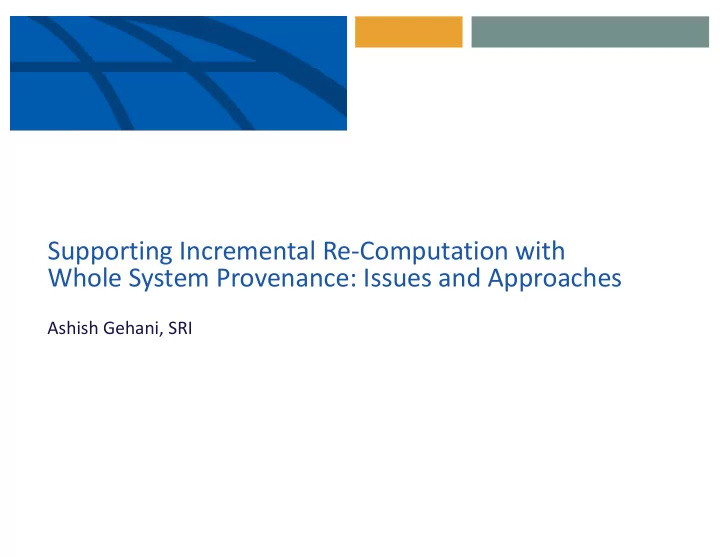

Supporting Incremental Re-Computation with Whole System Provenance: Issues and Approaches Ashish Gehani, SRI
Incremental Re-computation File 2 Read • Supported via memoization open() close() – Database query engines File 1 Read close() open() – Workflow planners Process execution Time – Software build systems close() open() • Optimized with provenance File 3 Write – Identify affected subgraph • Forward slice from new inputs Output – Identify dependencies • Backward slice from affectees Operation • Whole system provenance Input 1 Input n – Applies to range of applications Ashish Gehani, Ulf Lindqvist, Bonsai: – Introduces variety of challenges Balanced Lineage Authentication , ACSAC , 2007
Whole System Provenance Manual Curation ! • Multiple possible approaches PubMed Articles Enzyme Annotations Taxonomy Elements Ortholog Editor Compound Structure – Dynamic binary instrumentation (e.g. Pin) Database – Compiler-based transformation (e.g. LLVM) Application ! function initialize() int recordSize – Library call interposition (e.g. LD_PRELOAD ) var inputDatabase function processData() var errorMsg – Kernel hooks (e.g. LSM) function errorHandler() function writeBack() function terminate() var outputDatabase • Global view of monitored system Workflow Manager ! method beginWorkflow() file inputData • Provenance inferred is sound method feedback() method verifyState() file errorLog • … but often incomplete method processState() method updateLog() file workflowStatus Operating System – may suffice for ! System Startup Event Dispatcher System Log • staging read() write() send() recv() getKey() writeKey() File System Network Adapter System Registry • diagnostics Distributed System ! Grid Registry Authenticate • profiling Resource Manager Event Handler • authorization Network File System Cloud Processor – challenge for reproducibility • partial coverage Ashish Gehani, Dawood Tariq, SPADE: Support for Provenance Auditing in Distributed • semantic gap Environments , ACM Middleware , 2012
Issue: Ephemeral Intermediates • Example: – Software builds Pidname:)gcc Pidname:)gcc Pidname:)gcc Pid:)2169 Pid:)2160 Pid:)2163 link objects into Ppid:)2159 Ppid:)2159 Ppid:)2159 final binary Pidname:)collect2 Pidname:)cc1 Pidname:)as Pidname:)cc1 Pidname:)as – Objects files are Pid:)2170 Pid:)2161 Pid:)2162 Pid:)2164 Pid:)2165 Ppid:)2169 Ppid:)2160 Ppid:)2160 Ppid:)2163 Ppid:)2163 then removed – Memoization Pidname:)ld benefit is lost Pid:)2171 Filename:)protocol.c Filename:)ccC1p2KN.s Filename:)network.c Filename:)ccfELrl1.s Ppid:)2170 – Provenance still useful, but Filename:)protocol.o Filename:)network.o Modified) Artifact intermediates must Subgraph)that)needs)to)be)recomputed be regenerated
Approach: Maintain Data History TABLE I P ERFORMANCE ANALYSIS Apache Operations Improvement Complete re-execution 63564 Provenance-based re-execution 15701 75.3% Snapshotting filesystem + 13595 78.61% Provenance-based re-execution BLAST Complete re-execution 48602 Provenance-based re-execution 9811 79.8% Snapshotting filesystem + 8391 82.73% Provenance-based re-execution PostMark Complete re-execution 57344 Provenance-based re-execution 14305 75.05% Snapshotting filesystem + 10031 82.5% Provenance-based re-execution TABLE II S TORAGE OVERHEAD FOR PROVENANCE METADATA Apache BLAST PostMark Provenance-based re-execution 13 MB 8.7 MB 8.9 MB Hasnain Lakhani, Rashid Tahir, Azeem Aqil, Fareed Zaffar, Dawood Tariq, Ashish Gehani, Optimized Rollback and Re-computation , IEEE HCSS , 2013
Issue: Dependency Conflation • Often arises when: – Instrumentation is at coarser level of abstraction – Causality manifests at finer granularity • Examples, using system calls: – Web server sends a different file to each client process:terminal process:bash pid:2043 pid:2045 – Individual element ppid:1 ppid:2043 filename:httpd of data archive utilized path:/var/httpd local_ip:192.168.1.3 size:14350 remote_ip:192.168.1.18 • Implicated dependency filename:file1.html process:bash local_ip:192.168.1.3 path:/var/htdocs/file1.html pid:5226 remote_ip:192.168.1.25 size:1205 ppid:2045 subgraph explodes local_ip:192.168.1.3 filename:file2.html remote_ip:192.168.1.7 path:/var/htdocs/file2.html size:8136 • Much re-computation filename:file3.html path:/var/htdocs/file3.html size:7160 is unnecessarily performed
Approach: Execution Partitioning • Utilize finer-grained instrumentation • Example, using function calls: – Tracks web server’s input file ← output network flow dependency ID:serve_file.4-0 ID:cat.13-0 FunctionID:serve_file.4.2000 FunctionID:cat.13.2000 ArgType:i32 ArgType:i32 FunctionName:serve_file FunctionName:cat ArgName:client ArgName:client ThreadID:2000 ThreadID:2000 ArgVal:5 ArgVal:5 FunctionID:accept_request.2.2000 ID:serve_file.4-1 ID:cat.13-1 FunctionName:accept_request ArgType:i8* ArgType:%struct._IO_FILE* ThreadID:2000 ArgName:filename ArgName:resource ArgVal:0xbfa72afa ArgVal:0x9789578 ID:accept_request.2-0 ArgType:i32 ArgName:client ArgVal:5 ID:serve_file.8-0 ID:cat.18-0 FunctionID:accept_request.12.2000 FunctionID:serve_file.8.2000 FunctionID:cat.18.2000 ArgType:i32 ArgType:i32 FunctionName:accept_request FunctionName:serve_file FunctionName:cat FunctionID:main.0.2000 ArgName:client ArgName:client ThreadID:2000 ThreadID:2000 ThreadID:2000 FunctionName:main ArgVal:5 ArgVal:5 ID:accept_request.12-0 ThreadID:2000 ArgType:i32 ArgName:client ArgVal:5 ID:serve_file.8-1 ID:cat.18-1 ArgType:i8* ArgType:%struct._IO_FILE* ArgName:filename ArgName:resource ArgVal:0x243cda99 ArgVal:0x6754193 ID:accept_request.9-0 FunctionID:accept_request.9.2000 ArgType:i32 FunctionName:accept_request ArgName:client ThreadID:2000 ArgVal:5 ID:serve_file.7-0 ID:cat.16-0 FunctionID:serve_file.7.2000 FunctionID:cat.16.2000 ArgType:i32 ArgType:i32 FunctionName:serve_file FunctionName:cat ArgName:client ArgName:client ThreadID:2000 ThreadID:2000 ArgVal:5 ArgVal:5 ID:serve_file.7-1 ID:cat.16-1 ArgType:i8* ArgType:%struct._IO_FILE* ArgName:filename ArgName:resource ArgVal:0x9287c18d ArgVal:0xaa12997d Dawood Tariq, Maisem Ali, Ashish Gehani, Towards Automated Collection of Application-Level Data Provenance , TaPP , 2012
Issue: Changing Runtime Environment • Application context is complex • Code dependencies – Linked libraries – System services – Utility programs ������� ����������� ���������������� ����������� ���������������� ������������� ������������������������ ������ ���������� ����������� ����������� ������ ������ ��������� ������������ ����������� ������������������ �������� ������� ��������� ������ �������� ������ ����������� ������� ����������� ���������� ������� ������ ���������� ������������ �������������� ����������� ������������ ������������� ���������� ������� ������� �������� ���������� • Environmental dependencies – Shell variables – Shared memory contents • Changes in any can affect output
Approach: Code and Context Closures • Partition code into composable units (e.g. Docker layers) – Dependencies minimized, reducing need for re-computation • Virtualize application execution (e.g. Linux containers) – Replicated runtime environment Docker builds the package into a container according to the Docker fj le Wholly! generates a Docker fj le Execute build invocations ./configure && 4 Generated build products make && make install sqlite-3.18 sqlite-3.18 Download package source code 3 Source code Docker fj le Wholly! recipe Copy Wholly! subpackages that are 2 Build dependencies required as dependencies Copy base building environment 1 Base build tools (including Wholly!-built Clang compiler) Loic Gelle, Hassen Saidi, Ashish Gehani, Wholly!: A Build System For The Modern Software Stack , Lecture Notes in Computer Science, Vol. , Springer , 2018.
Issue: External Dependencies • Assume code / context closures • May still face challenges: System Call – User input System Call – Randomized choices System Call System Call System Call – Distributed computation System Call System Call System Call – Asynchronous interrupts System Call • Baseline strategy System Call Exception Handling constructs models System Call System Call Routine System Call – Significant engineering System Call System Call – Error-prone System Call – May still be incomplete System Call System Call
Recommend
More recommend